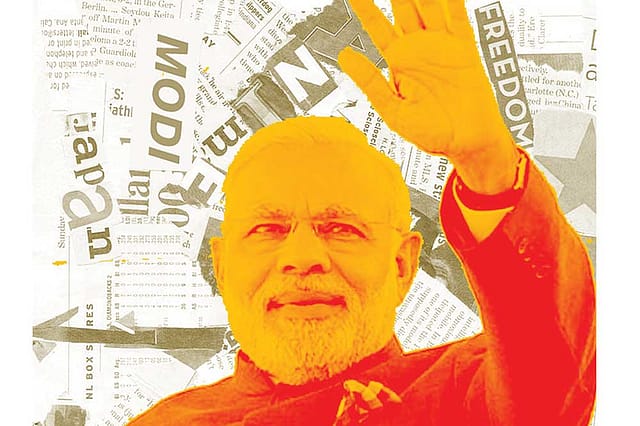Modi Beyond Bad Headlines

TO BE CONDEMNED by headlines can't be anything new for Narendra Modi. He has overcome the worst of them, and that may partly explain his distrust of the media. A lesser political life would have come to an abrupt end under the weight of front pages, but his was one that drew its strength from the worst of morning news, and the severest of editorial punishments. It was as if being alone against the wall only hardened his will to defy, to win. It has always been a lone fight, every instance of adversity an inspiration for the next astonishing moment. He reached Delhi after one of the longest campaigns in political history, and it was one man's rejoinder to the cosy assumptions of the entitlement raj. In victory, there was just one man and his argument.
More than two years on, Prime Minister Modi is the only politician who is still having an argument. It is amazing that the losers of 2014 are still irredeemably steeped in defeatism, and their idea of the future is a man who is struggling to be politically coherent. It is a mark of the unclaimed space in our democracy that there is no counter-argument to Modi; there are only indictments. He is still the conversation, and he is still the idea on which India prefers to build its future—brighter or worse. He is still our collective impatience.
The headlines do not reflect that. They tell of the waywardness of a wretched republic where little mercies are hard to come by, and where power is so pathetically detached from responsibility—or empathy. Where majoritarian tyranny continues to silence the lowest lives in the caste hierarchy. Where the unhinged cultural Right has taken complete copyright over the civilisational virtues of Mahabharat, which, incidentally, exists only in the delirium of newly empowered Hindu vigilantes. Where a new patronage system has already de-intellectualised institutions. And where India's unity is only geographical, with little national or emotional content—look at Kashmir and shudder.
Rule Americana
16 Jan 2026 - Vol 04 | Issue 54
Living with Trump's Imperium
This India continues to multiply in our morning papers, on prime-time television, and we seem to be pretty sure of why it is happening: India has changed under the divisive politics of the new ruling establishment. We read that social fault lines have become starker because the Hindu Right will go to any extent for the realisation of a unipolar India; we read that, despite his modernisation agenda, the Prime Minister has spoken little to rein in the mad men of Hindutva. We read that a polarised India is what the religious Right wants because it makes Hindu mobilisation easier. We read that even as the Prime Minister is busy shaping his own mythology as a man in constant conversation with the future, cultural India is travelling back in time. We are being haunted by headlines.
In this column, I am stepping out of the hellhole of those headlines, into a space that is liberating, and certainly worth celebrating. This India is one of the most stable economies, growing at a rate of more than 7 per cent. If we can keep up this pace, and there is no reason why we can't, India will soon be the marketplace of choice in the East, its democracy quotient making it all the more attractive. Thank God no one is saying 'Shining India', and it is not a bad thing that the sunshine has been taken for granted. It all looks so natural. Modi's capitalism is not an idea borrowed from Thatcherism or Reaganism; it is Indian to the core, with an overwhelming social conscience. For Modi, India is such an unequal society that the state cannot afford to withdraw fully from the marketplace. Still, there is a greater sense of independence and confidence, and a greater sense of adventure: the new entrepreneur of India is not afraid of failure. The biggest economic achievement of Modi is that he has created an atmosphere where the ambitious can play out their dreams. And this market has become increasingly incompatible with crony capitalism, the inevitable child of the earlier regime's regulation raj. For once, the level playing field is real, and there is no class system that separates the players.
And how rewarding it is for an Indian to miss the scandal-and-scam headlines. In its ten years in power, the previous Manmohan Singh regime had made corruption the state religion; the dutiful doctor, pretending not to see the sleaze swirling around him, presided over one of the world's most corrupt regimes. It is good that we have come to take a clean administration for granted, that no slogan has been made out of transparency or corruption-free governance. In any evolved civil society, such civilities should be natural. For India's Prime Minister, India is the only interest.
It is the oldest of injustices that make headlines even now, but for a section of India that puts it conscience on a placard, Modi is the sum of all our misfortunes, cultural as well as political. The good news is that the India beyond bad headlines has come to take these people too for granted.
